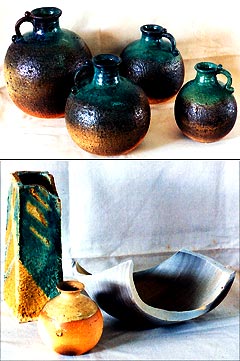Ceramic art of Ruchira Marshal
Yohan Ruchira Marshal
had an aptitude for Art in his schooldays. He Went to The National Design
Centre one day with his father, after leaving school.
Ruchira’s attention was riveted by the way ceramic items were being
manufactured at the Centre, with the use of moulds. So from that day on he
thought of ways and means of manufacturing ceramics himself. He entered the
National Designs Centre first and then the Gramodaya Jana Kala Kendraya, getting
a basic training in ceramic art using red clay and the simple ‘sakaporuwa,’
(potter’s wheel.) In this way Ruchira got firsthand knowledge in turning out
ceramics. He was also lucky to work for a private institution for about one
year.
After some time Ruchira entered the Dediyawela Ceramic Training Centre which
comes under the Industries and Small Industries Department of the Western
Province, where he did a two-year Higher Training Course. Ruchira was lucky to
have a comprehensive training in Ceramic Art under the expert guidance of
Hiroouki Asakura, a Japanese expert in Ceramic who had come to Sri Lanka as a
voluntary service provider It was under Asakura that Ruchira received
comprehensive training in all aspects of Ceramic Art.
A note says that Yohan Ruchira who is keenly interested in research, experiments
in various methods of ,manufacturing ceramic items. He has now received a
thorough grounding in and knowledge of alternative craftware.
Right now he is preparing to hold his first one-man exhibition at the Lionel
Wendt Art Gallery from the 24th,25th and 26th of this month. For his
exhibition, Ruchira has tested various methods of Ceramic art. There is hardly
any traditional ceramic creation that he has not produced. Ruchira says that a
special feature of the exhibition will be creations turned out in different
temperatures.
Ruchira says : In the manufacture of of these I did my utmost to maintain the
artistic value of the items.’ He says that as at an earlier two-man exhibition
he did not pay any attention to consumer products. However, this time he has
made items under both high and low temperatures. He has also tested out new
methods of burning the ceramic to achieve the desired finish. Ruchira says that
at his latest exhibition, he has items that not been seen previously on the
local market. These items are made according to the most modern methods, he
says.
An interesting point Ruchira made was that local ceramic manufacturers who did
not go beyond the functional always made the ‘sakaporuwa’ rorate leftward.
Ruchira has broken new ground in making the wheel rotate to the right.
The exhibition presents both largescale and smallscale manufacturers of
ceramicware in the country. Creative industrialists like Ruchira hope to target
the market. He says that funds play the most important part in the manufacture
of ceramicware.

